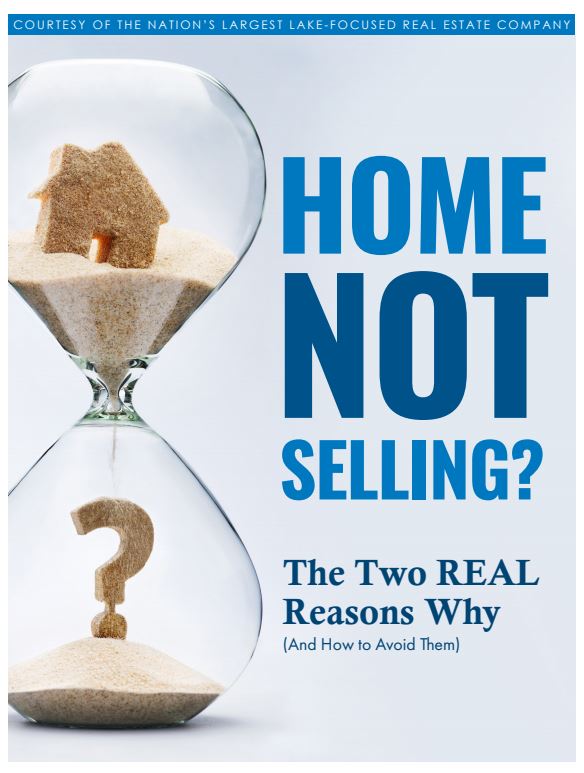Lake Homes Realty CEO, Glenn Phillips, discusses five myths about selling a lake home. While there are many similarities between selling a lake home and a primary residential home, there are key differences. For lake homes, these include the higher percentage of out of town buyers, the impracticality of open houses, unusual aspects that break automated valuation systems, and buyers’ value shifts from opulence to practicality. If you’re considering selling a lake home, find a lake agent who understands these unique traits of the market.
Tag: real estate industry
Whiteboard Topics: Is It a Good Time to Sell a Lake Home?
With COVID-19 on lake homeowner’s minds, many are wondering if now is a good time to sell their property. Lake Homes CEO Glenn Phillips outlines five reasons why now is a good time to do so.
During these times, sellable and appropriately priced homes are selling fast, and prices are stable. For buyers looking to mortgage their home, they are attracted to the historically low interest rates.
Finally, there’s a high demand for lakefront property, and the market peak has continued to rise. If you’re exploring the idea of selling your lake real estate, keep in mind that the process is often slow and hiring a lake expert agent will facilitate the process with their expert knowledge.
Would you like to learn more about selling your lake property? Here is a FREE downloadable guide:
Home Not Selling? The Two REAL Reasons Why DOWNLOAD NOW
DOWNLOAD NOW
Whiteboard Topics: Types of Sellers During COVID-19 Pandemic
The current changes in the economy has created new types of home sellers.
In this video, Glenn Phillips, CEO of Lake Homes Realty, discusses seller profiles you’ll find in the present COVID-19 real estate market.
For more industry news, click HERE.
Trust Your Appraisers, Not an AVM

Lake properties are unique, and the way their values are determined is too.
Unlike homes in off-lake suburbs that may feature cookie-cutter properties, no two lake homes are alike.
The fact they can be so different throws a wrench in how automated valuation models (AVM) estimate their worth.
Automated valuation models provide buyers and sellers with base price points for listed properties.
However, data scientists with the National Association of Realtors caution consumers that AVMs are “not a substitute for formal appraisals, comparative market analysis, or the in-depth expertise of real estate professionals.”
When it comes to buying and selling unique lake properties, ones that don’t fit into the generic AVM mold, only a highly trained, objective and knowledgeable appraiser can accurately determine your home’s value.
The Appraiser/AVM Difference
AVMs determine estimated home values by analyzing quantifiable structural and public property data like a home’s number of bedrooms and baths, lot size and sales history.
Some tools may also include limited MLS data and user-submitted information.
However, algorithmic estimations do not reflect the more personal aspects of your property like its view of the lakefront, unusual features such as a private peninsula or your home’s overall visual appeal.
Nor do AVMs consider how many feet of lake frontage your property has, the depth of water at your property line, or whether you can build a dock in the future when calculating value estimates.
An appraiser, on the other hand, formulates home values using a combination of all these things.
Either side of a real estate transaction can hire an appraiser. Most commonly, mortgage lending institutions require an official property appraisal to verify that buyers’ loan amounts are accurate.
Only verified property appraisal values can be used as a base for challenging a seller’s asking price during contract negotiations for this reason.
AVM values also bear no significance in negotiations or in determining appropriate mortgage amounts.
The Appraiser’s Checklist
Because appraisers work closely with financial institutions, these licensed and certified real estate professionals are required to use Fannie Mae-sanctioned report forms to determine how much a property is worth.
Homeowners and prospective buyers can access the 2019 Uniform Residential Appraisal Report, or Form 1004, for free here.
In addition to reporting property details about the subject property, like its foundation type, the number of stories, square footage and age, appraisers also record outside factors that may influence your lake home’s perceived value.
Influencers include neighborhood characteristics such as how much of the area is built-out opposed to undeveloped; whether neighborhood growth is rapid, stable or slow; and supply and demand in the area.
Appraisers must also answer if your lake property “fits” in your neighborhood in terms of its style, condition and construction.
Appraisal values reflect materials used and the condition of your property’s exterior walls, flooring, trims and finishes and any additions and upgrades made, as well.
Both location and physical appearance factors contribute to how potential buyers form their opinions on how much a property is worth to them.
The Uniform Standards of Professional Appraisal Practice instructs appraisers to be “independent, impartial and objective” when evaluating properties.
Appraisers who are intimately familiar with consumer attitudes and behaviors, and the current climate in your specific lake real estate market, use these sentiments in tandem with quantifiable data to formulate comprehensive, well-rounded home values.
Professional appraisers also compare your property to similar on-the-market and recently sold homes to support their final estimations.
Appraisers Offer Better Accuracy
Professional appraisers’ holistic approach to determining how much properties are worth allows them to provide consumers with more accurate value estimations than electronic AVMs.
Consider this: AVMs cannot physically tour your property and therefore, can’t “see” its condition.
Take two lake properties, one right next to the other.
Both Property A and Property B were built in 2003, both are 5,000 square feet and both have the same number of bedrooms and baths.
Both properties are on same-sized lots and both have lake views.
An AVM may take these property characteristics and determine similar home values for these seemingly comparable homes.
However, because the AVM is confined to numerical data analysis, it cannot accurately compare these homes. It can’t take into account that Property A has been so poorly maintained that its paint has faded, its windows have been broken and its boat dock destroyed by the elements.
Property B has been well taken care of, fitted with energy-saving appliances and features a newly rebuilt boat dock.
These properties also differ in that Property A has a poor lake view because of a row of lake management-protected trees near the shoreline, while Property B has a clear, picturesque view of the waterfront.
An appraiser can walk Property A and Property B individually, taking into consideration their respective similarities and differences to appropriately estimate their worth.
An appraiser can more accurately define what makes a property “comparable” to the subject property concerning condition, amenities, lake access, etc.
Lake Homes Realty Named to Inc. 5000 for Third Consecutive Year

Inc. Magazine released its 2019 Inc. 5000 this week, honoring Hoover, Alabama-based Lake Homes Realty as one of the fastest-growing privately-owned companies in the nation for the third consecutive year.
“Each year it becomes increasingly difficult to be named on the Inc. 5000,” said brokerage CEO Glenn S. Phillips. “Making the list for the third year in a row is a testament to our team and agents’ efforts to deliver great service, and how our industry-leading technology provides us unique ways to better serve our clients.”
Lake Homes Realty ranked No. 2491 on the magazine’s 38th annual Inc. 5000 list. In the real estate category, the brokerage ranked No. 5 in Alabama and No. 106, overall.
Inc. Magazine’s Inc. 5000 represents a unique look at the most successful companies within the American economy’s most dynamic segment of independent small businesses.
Some of the world’s most famous companies like Microsoft, Dell, Domino’s Pizza, Pandora, Timberland, LinkedIn, Yelp and Zillow, gained their first national exposure as honorees on this list.
“The companies on this year’s Inc. 5000 have followed many different paths to success,” said Inc. editor-in-chief James Ledbetter in a recent press release. “There’s no single course you can follow, or investment you can take that will guarantee this kind of spectacular growth. However, what they have in common is persistence and seizing opportunities.”
2019 Growth
The 2019 Inc. 5000 list reported Lake Homes Realty’s growth rate at 158% over the last three years.
Company growth in 2019 spurred the addition of office space at the company’s corporate headquarters in May after hiring a new director of marketing and expanding its market footprint into western states.
“We are serious about our growth every year, but are even more focused on accelerating growth this year,” said Phillips. “Shortly after we hired our director of marketing, we also hired a digital marketing manager and are in the process of hiring additional support staff to the home office team.”
Lake Homes Realty’s home office staff currently occupies 40% of their multi-tenant, three-story headquarters.
“The challenge we face is growing our corporate team quickly enough to support our rapid growth in both our sales and marketing operations,” said Director of Marketing, Mark Griggs. “We are actively interviewing for technical writing, digital content production and event coordination positions within the marketing department, alone.”
The brokerage currently operates in 26 states nationwide, with the company’s sights set on continued westward expansion. As the market footprint increases, so does Lake Homes Realty’s need for local lake real estate experts in new markets.
“Lake Homes Realty is a new breed of tech-enabled service company that fuses the power and convenience of the web with the personal service that can only be provided by our local experts on each lake,” Phillips explained. “As technology and the real estate industry evolve, our business model — combined with our leadership, professional agents and our staff’s hard work and development — will be paramount to our continued success.”
If you are interested in joining the award-winning Lake Homes Realty home office team, current position openings can be found under “Employment” on our website home page “About Us” section.
For more information about becoming a Lake Homes Realty agent, visit https://lakehomes.com/info/become-an-agent.
Inc. 5000 Methodology (2019)
Companies on the 2019 Inc. 5000 are ranked according to percentage revenue growth from 2015 to 2018. To qualify, companies must have been founded and generating revenue by March 31, 2015.
They must be U.S.-based, privately held, for-profit, and independent–not subsidiaries or divisions of other companies–as of December 31, 2018. (Since then, some on the list may have gone public or been acquired.) The minimum revenue required for 2015 is $100,000; the minimum for 2018 is $2 million.
As always, Inc. reserves the right to decline applicants for subjective reasons. Growth rates used to determine company rankings were calculated to three decimal places. There were 12 ties on this year’s Inc. 5000.
For the full 2019 Inc. 5000 list, visit https://www.inc.com/inc5000/2019/top-private-companies-2019-inc5000.html.
Exploring Lake Real Estate: Real Estate Moguls Interviews Lake Homes Realty CEO Glenn S. Phillips
“A gentleman asked me one day ‘Hey, Glenn. I’m thinking about buying a lake home. We’ve never bought one. What’s the best lake?’ And I said ‘Well that’s kind of like asking me what’s the best woman. It’s kind of a personal choice, and if you don’t know which lake you like, you need to date a few’.”
Glenn S. Phillips
There’s no one who knows more about the ins and outs of the lake real estate market than Lake Homes Realty CEO Glenn S. Phillips. That’s why Real Estate Moguls creator Grant Findlay-Shirras caught up with Glenn recently to interview him about the industry.
What made Phillips, after a career in computer engineering, decide to tackle a nationwide niche real estate market? Why is LakeHomes.com built the way it is, and what makes it one-of-a-kind? And how does this brokerage differ from Century 21, RE/MAX, or any of the other well-known brands of today?
Well Findlay-Shirras just got the answers to all your questions. Check out the video below to learn more about the magic that makes Lake Homes Realty possible.
Know the Difference: A Buyer’s Market vs A Seller’s Market

In recent years, there has been a lot of uncertainty surrounding the housing market, both locally and nationally. Thanks to the Great Recession of 2008, the last decade has been a roller coaster of bidding wars, increasingly tightened inventory and escalating home prices.
This is particularly true for vacation homes, which have been slower to bounce back from the housing crash than traditional, primary residences.
Now that markets around the country are stabilizing, however, trends are getting easier to analyze. So whether you’re buying a lake home or selling one, it’s important to understand your market’s conditions. Is it a buyer’s or a seller’s market?
That all depends on the current ratio of supply and demand, and each one means very different things for those wading through the buying and selling process.
A Buyer’s Market
Simply put, a buyer’s market indicates that supply exceeds demand. In other words, there are more homes on the market than there are buyers looking for them. This scenario effectively puts the power of negotiation in the buyer’s hands.
With plenty of houses to choose from, buyers will likely have an easier time finding a home than sellers will have selling theirs. In fact, sellers will need to do all they can to stand out in a crowded market.
This sometimes means lowering asking prices to remain competitive. If that’s not an option, offering to pay for closing costs or moving expenses could be enough to secure a sale. And when shoppers have so many options, they have the upper hand on setting conditions like contingency offers and extended closings.
A Seller’s Market
In a seller’s market, demand exceeds supply. With more buyers searching for homes than there are homes on the market, conditions are in the sellers’ favor.
The lack of available inventory can often lead to multiple offers on the same house. And where there are bidding wars, there are homeowners sure to sell for more than the asking price. Needless to say, a seller’s market is the ideal cycle to list your home.
Because this situation puts sellers at an advantage, buyers who may try to haggle down an asking price likely won’t get very far.
In order for shoppers to secure their chances of finding a home in a seller’s market, it helps to not ask too many favors. When sellers have the power, they can easily turn down buyers who are asking for them to throw in the washer and dryer or refurbish the kitchen counters as buying conditions.
Also, cash offers, larger down payments and pre-approvals can propel a potential buyer to the top of the priority list when multiple offers are on the table.

How to Judge Your Local Market
Judging the state of your local market is key to maintaining control and perspective throughout the buying and selling process. One way to determine which way the winds are blowing is to check the amount of available inventory.
Low inventory is typically indicative of a seller’s market. However, ratio matters.
If there aren’t a surplus of buyers at the same time, low inventory could just indicate a stalled market.
An area with a rocky economy may see a surplus of available homes as homeowners are being forced to sell. This, in turn, creates a buyer’s market.
But towns or cities with booming industries and thus plentiful job opportunities are the exact opposite. Future residents would flood into prosperous areas to take advantage of burgeoning opportunities, quickly creating a seller’s market.
In the case of lake real estate, where a large portion of the residences are vacation homes, properties tend to take longer to sell, as they aren’t must-have residences. Therefore, determining whether or not it’s a buyer’s or seller’s market can get a little more tricky. There are simply more variables to consider.
Is the lake remote and rural, or is it 20 minutes away from downtown? Is it a retirement community, a year-round residential lake, or are most of the properties vacation homes?
Larger lakes, like Lake Michigan, have a variety of diverse communities surrounding them and, therefore, may have seller’s markets in one and buyer’s market in the other.
In the end, every market is unique and no two have the same determining factors at play. To save time and effort, hire an expert lake real estate agent who can construct market analysis and help you decide the most strategic way to stand out among the competition.





